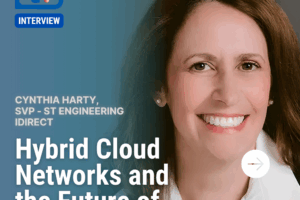Bob De Haven – General Manager, Worldwide Communications and Media at Microsoft speaks to Teletimes in an exclusive interview during his visit to Dubai
Khalid Athar: In a brief overview, give us your expert perspective on where we stand digitally.
Bob: Digitally speaking, I think we are across the Rubicon, in that many organizations are seeing their growth coming from a digital backbone. IoT, the connection of automobiles and healthcare – all that traversing through the carriers into the digital space – has taken hold. As a result, many carriers are starting to digitize their own internal operations to become more efficient. I think that’s the big race now. Our partnership with AT&T is a great example of this – we announced earlier this year that Microsoft is AT&T’s preferred cloud provider for non-network applications as part of AT&T’s broader public-cloud first strategy, and we’re also supporting the company as it consolidates its data center infrastructure and operations. This signifies an established telco realizing it needed to become a digital transformed business to compete in the market.
KA: How has Microsoft’s evolution over the years transformed the computing and communication ecosystem?
Bob: Our mission is to empower every person and every organization on the planet to achieve more. And our heritage as a company is around productivity and communication. Today we talk about digital transformation – the power to engage customers, empower employees, optimize operations and reinvent products and services. I think we have had a heavy influence on this progression over the decades, especially in the telco industry. As 2G migrated to 3G, 3G migrated to 4G and 4G migrated to 5G – with the bandwidth getting larger and the ability to move data becoming faster – Microsoft has become a core part of that environment.
And in addition to supporting this kind of core infrastructure, we have developed innovative solutions to modernize the workplace, including Microsoft Teams, which has become the hub for teamwork within Office 365. Teams allows for communication and collaboration, whether you want to do it in an email, text, voice or digital format, and it’s integrated into a single low-weight application that runs on a 5G network really efficiently. And I believe that as you bring more people into the discussion, you solve problems much faster.
We are seeing this affect various industries; for example, in Hollywood, the whole concept of producing movies used to be behind the studio door. Now, by moving content creation and production into the cloud, we are spreading that out across the globe so more people can contribute to that movie in a much faster, more efficient way. And this extends to the way content is distributed as well.
KA: What is Microsoft’s vision for the future and what major factors are driving Microsoft to fulfill this vision?
Bob: Our vision of the future is empowering everyone to achieve more with our intelligent platforms and solutions. And a big part of this is the democratization of information; distributing data to more and more sources to make people more successful. We are doing that now through AI, but in the right way – anonymizing data and ensuring nobody’s personal information is captured and shared with others. That’s a critical part of our differentiation as the trusted cloud. This kind of democratization of data and empowering the individual and organization to achieve more is the future, and Microsoft is right in the middle of it.
KA: In which key markets in and around this region do you see the greatest potential and required policy support that suits Microsoft’s vision of the future?
Bob: There’s great opportunity currently in UAE. In fact, we have two data centers that went live in Abu Dhabi and Dubai earlier this year. I think security is still the number-one issue in this region, and we know there are requirements around data residency, and we believe this plays to our strengths by having these local data centers in region.
We have been in the cloud business for close to a decade, and we work with regulatory agencies in China, Australia, Singapore, UAE, South Africa and many others around the globe. So, we’ve got a lot of layers of security and compliance baked into our environment. Because of the breadth of Microsoft’s network, and because we are working in 180 countries doing cloud business, every regulatory issue you can think of is being addressed with us. We focus on moving those problems away from customers so they can focus on their core business. Secondly, Microsoft’s policy of handling privacy differs from our peers. We’re the trusted cloud. And third, and increasingly more important, is Microsoft’s position as a platform cloud as our core business and not an aggregator of others’ information and data. We empower, never compete, with our customers.
KA: What are some of the most practical use cases of AR, global cloud, high-speed connectivity and high-performance computing?
Bob: The most compelling one I am seeing right now is in tourism. I have seen AI and VR in theme-park environments. I have seen people take AI and VR all the way from the booking of a hotel room, to entry into the hotel with facial recognition, to recognition of the person who has booked – so the check-in happens instantaneously. Also, by offering mixed reality devices, such as HoloLens, in hotel rooms and allowing people to go on thrill-rides or other exciting experiences using those devices, resort organizations allow guests to relive key moments from their vacation when they go back home.
Microsoft did a great job making Xbox a social experience. Gaming was previously a singular experience, and we created the Xbox community where gamers could start competing and sharing. And that whole market has evolved into something rather significant since then. We see AR/VR really coming into that e-gaming space.
KA: What does 5G mean to Microsoft’s global computing goals?
Bob: 5G is going to make our carrier partners much more successful and much more integrated into every industry, whether they are primarily serving consumers, enterprise or SMBs. We also see 5G as an opportunity to bring our edge computing value proposition to life; the more prevalent 5G becomes, the more opportunities there are for edge computing, or moving compute power out of data centers and closer to the edge of the network, so that people can utilize that compute network efficiently. Edge computing is particularly valuable for scenarios that require near-real-time communication and very low latency like AR, VR, or video distribution on content delivery networks, commonly known as CDNs.
So, the more compute power we take out of the data center and push to the edge, the better for 5G and the public cloud. I see this requirement of edge compute and carriers’ networks as a critical part of our strategy, and we are working with them – not in competition with them – to bring more value to their subscribers. The perfect example is in gaming with Project xCloud, which we’ve recently launched. We are taking the Xbox devices out of the home and putting them in the public cloud so people can play stream games anytime, anywhere and on any device. For a carrier, speed, or latency, can be a differentiator in customers’ experience.
KA: What lies at the heart of your collaboration with Telecom operators?
Bob: Trust. They see us as security and privacy partners, but they also see us as having synergies and collaborative value. We see the carriers as instrumental in countries where they control policies, they control access and they control all the elements of government. So, we want to work with them in this environment. Yes, I would say trust is the number one issue.












